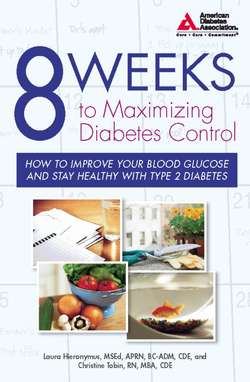Читать книгу 8 Weeks to Maximizing Diabetes Control - Laura Hieronymus - Страница 7
На сайте Литреса книга снята с продажи.
ОглавлениеINTRODUCTION
You can’t change a diagnosis of diabetes. You are not the first person to wish that you didn’t have diabetes, nor will you be the last. But the fact is, you do have diabetes and this chronic disease will be with you for the rest of your life. Life goes on…and the most important thing for you to do is learn how to get your blood glucose under control. The good news is that people with diabetes can learn to self-manage their disease. With type 2 diabetes, that generally means making some healthful changes in behavior to help control your blood glucose levels with the advice of your diabetes care team.
Whether you are newly diagnosed with type 2 diabetes or you have had it for several years, one thing is certain: Knowledge is power. The more you know about diabetes, the better equipped you are to make informed decisions about your health. You and your diabetes care team can work together to assure that you have the knowledge and skill that is necessary to help you attain and maintain the best possible blood glucose control. In addition, the ability problem solve and have effective coping strategies to deal with the ups and downs managing a chronic disease are necessary to achieve positive lifestyle behaviors. The American Association of Diabetes Educators developed framework of seven self-care behaviors that measure, monitor, and manage outcomes.
AADE 7 SELF-CARE BEHAVIORS
The following self-care behaviors are the framework for measuring, monitoring, and managing outcomes.
1. Healthy eating
2. Being active
3. Monitoring
4. Taking medication
5. Problem solving
6. Healthy coping
7. Reducing risks
American Association of Diabetes Educators, AADE Self-Care Behaviors. www.diabeteseducator.org. Accessed March 2007.
8 Weeks to Maximizing Diabetes Control offers suggestions and guidance for people with diabetes to help put into perspective these diabetes self-management tasks or self-care behaviors that, at times, can seem overwhelming. It may be helpful for you to think about these self-care behaviors as they relate to your personal diabetes health.
Taking each self-care behavior and dividing it into realistic goals may help you move forward. To help maximize your diabetes control, you may want to focus on one self-care behavior and make changes in that area. Or in some cases, it may benefit you more to make changes that will enhance more than one self-care behavior to positively impact your blood glucose control. The eight-week format that is introduced with self-care behaviors that are strategic in diabetes management can be evaluated with your A1C measurements. Although A1C is an index of average blood glucose for approximately 120 days, the preceding 30 days contribute more to the level of A1C than blood glucose levels 90–120 days prior.
AS significant new research in the area of diabetes is published and more and more tools and technology are available, it always remains important for you to be aware of and embrace the variety of recommendations to enhance your diabetes health.
All the best,
Laura Hieronymus, MSEd, APRN, BC-ADM, CDE
Christine Tobin, RN, MBA, CDE
